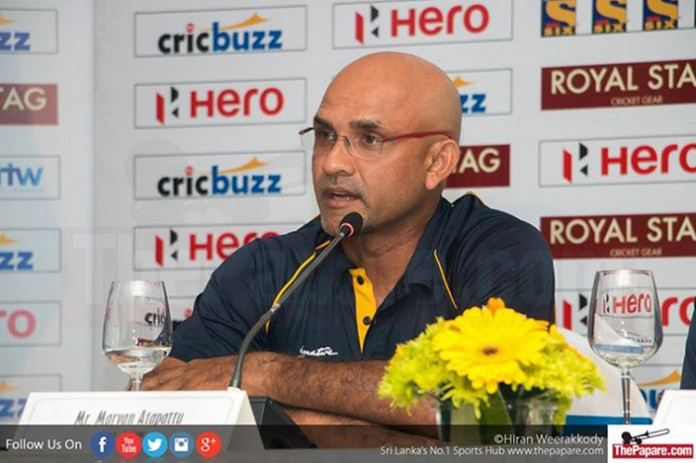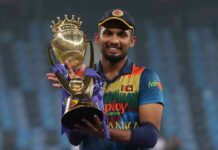Marvan Atapattu loved those marathon vigils at the crease. He dinked, stonewalled with a straight blade, shouldered arms and forced the bowler to change his plans. With his sublime drives, built platforms for the middle order and enacted rescue acts. He compiled big scores with his white flannels drenched in sweat. Toil and effort were the cricket anthems he sung on the pitch for close to two decades.
Courtesy – Cricbuzz.com
The affable cricketer also had a horror start to his career – five ducks in his first six Test innings. Many sportspersons would have been deflated or despondent after a barren run spreading over seven years. But hard work was akin to a prayer for the opener. Eventually, he reaped rewards with his maiden century against India at Mohali in 1997 and ended his career with 27 international hundreds across formats.
In an exclusive chat with Cricbuzz, the former Sri Lankan captain looked back at his noteworthy career, his tenure as the captain of the national team, coaching stints and views on the current Sri Lankan team.
If we jog our memory down the lane, you made your Test debut in 1990, but after your debut, you didn’t open your account in five of your first six innings. It was only in 1997 you compiled a Test hundred against India at Mohali. So how were you able to overcome a barren run extending over seven long years?
One thing I did know at the time I got a hundred [against India] after all those zeroes was how I did it. Reflecting back how I got it, I can only put it across to the determination, the faith I had in me, my technique, my ability and the support that I got and the clarity that I had in my mind, [in] my head to play for Sri Lanka again. And the pleasure that I was going to get by playing for Sri Lanka, that motivated me.
After that horror start, runs started to flow. You scored a hundred in the tri-series final against England in 1998, you scored a double hundred in Galle against England, 185 at Lord’s and also that century against an Australian attack comprising Michael Kasprowicz, Jason Gillespie and Shane Warne at Colombo (SSC). Five-six years of consistency.. so how do you look back at that phase of your career?
I mean, see when the individual reaches maturity, when he becomes familiar with his environment, surroundings, his opponents – run-making becomes so much easier. And it makes no difference to me, I was lucky enough to have been considered for selection after all those zeroes that I got initially. There wasn’t this much of competition back then. When you as I said reach a certain stage, I think if you have that solid foundation, it becomes much easier than not having one.
What about support that you received from seniors like Arjuna Ranatunga? How do you look at the role seniors played in helping you to come good?
When it comes from… when the words of wisdom comes from the seniors, your captains, your senior players, it tells you something more than what the papers have to say, what the TV channel has to say. You know then they are genuine. The captain says a word about a player… because if he says something that is not true, it will only harm his team. You know those words are for real. Things like that boost your confidence.
You took over as the captain of the national team in 2003-04. During that time, Sri Lanka won Test series against South Africa and lifted the Asia Cup title. So how do you look back at your stint as the captain? Was it an enjoyable experience?
It was enjoyable. See, when you start playing cricket, when I started playing at the age of 7,8 and 9 or whatever at a very young age, you’re not thinking of playing for Sri Lanka, you’re thinking of playing for your school in junior level. When you start playing for junior level in your college, ‘you think ok what about the senior team’? As quickly as I can [I need to find a place]. When you get to represent your senior team at the age of 15 [you think], ‘am I good enough to play for Sri Lanka’? When you get to play for Sri Lanka, you’re hoping to be successful. You get zero after zero, then you think, ‘oh, I have got to establish myself here’. When you sort of establish yourself, then you being offered to captain [the side]. Why not? I mean you’re the captain of the country. I mean, it is a great pleasure and privilege to captain your country. It is one person, it is only one person who can do that and when it is you who is doing the job, well for me it was the thing.
You were also known for your fielding skills. So was fielding an aspect that you worked on?
I remember working hard on direct-hits. I did not want to leave the ground, I did not want to leave the field.. I went hours and hours doing one discipline. I met a friend recently who said that… I didn’t remember but he was saying the number of hours we put together just at throwing at a stump or throwing balls at me for me to get the drives going or whatever.
Out of your 16 Test hundreds, six were double hundreds. What aspect you looked at to get those big scores?
What motivated me was the number of zeroes that I got. I always tended to think as an opening batsman, when you face the first ball without [or] not knowing how the ball will move, sometimes you really do not know the action of the bowler even. It is a huge chance that you might nick one. I used to think if I survive, if I get a start, if I get to a situation where I feel comfortable, I won’t let this go. That worked in my mind.
Your career didn’t exactly end on the right note. You had some issues with the then selection panel led by Ashantha de Mel. So is there a tinge of regret at the way your career ended?
Probably, I regret.. [or] I won’t put it in that manner. But I went through a period where I was so desperate, hurt and these words just came… these words just came. It was here [in the mind]. I just couldn’t tell this to anybody other than my family and there was a period where I was in the team, not given a game [in] 2007. Although I was the captain, I went out for a surgery and a lot of things were hurting inside. This particular press conference was just a let out.
After retiring from the game, you became the head coach of Singapore and later on, the batting and assistant coach of Sri Lanka. How do you look at the coaching side of things?
It is more challenging, more challenging than playing. It is certainly more challenging. It is about you being an all-rounder in the sense that you get individuals amongst the team with different needs. Some[one] is a senior player who has scored over 8,000, 10,000 runs. Somebody is making a debut, somebody is going through a bad patch, somebody is coming out of injury, some person is making a comeback. Sort of identifying these… identifying the individual, comforting them, throwing challenges, to get the best out of them to have sort of positive results is quite a task.
What is your specific role as the mentor of Belagavi Panthers?
See what we discussed is basically we know that we have a very interesting and a young talented group of players and they all know that they have a very good chance of going to that next level… the IPL or maybe even the Indian team. These guys need a lot of support and backing from support staff, management – like from us to get to that next level. They just can’t be left alone because this game of T20 is very intense, very very intense. So it happens in a flash, you got to be on the board, you got to be telling what is good, what is not good. I mean I’m here to share my experiences and hopefully, help them get to the next stage.
Sri Lanka is going through a bad phase. Recently, they were whitewashed by India across all three formats. Some believe domestic structure needs to be revamped. And others point their fingers at school system not being as strong as it used to be. So what are the areas you feel Sri Lanka need to improve upon?
You’re right. I mean for the future, because our school cricket is not as good as it used to be, for instant results we need to cut down on the number of clubs and make it more competitive for players to mature soon. We can’t be waiting until somebody is 35 to play for Sri Lanka because if we don’t have the competition, your progress drags on. So, to give them competition, try to filter out players. Unless otherwise, you have a good school system where players come out from school, ready to play for Sri Lanka, which was the case back in the 1980s and hopefully early 1990s. But after that not. So we have to look into those two areas. For the immediate thing, I think the club structure needs to be revamped and in the long run, we need to look at school structure which was our strongest point.
If you look at Sri Lanka’s pace attack, the likes of Dushmantha Chameera, Nuwan Pradeep and Dhammika Prasad have been laid low by injuries. Is it an area of concern for Sri Lanka cricket?
See, the point is all this is a way of life. Somebody getting two hundred is a way of life, somebody getting three hundred is a way of life. Most people who have got three hundred, have got more than one three hundred because they know how to do it. People who have got two hundred, have made more than one two hundred because they know how to do it. People who have got five wickets [in an innings], they have got more than 10-15 five-wicket hauls because they know how to do it. If a fast bowler doesn’t know how to bowl 20 overs in a day or 18 overs in a day, he will be pushed to bowl that 15th over, he might get injured. So it is about getting your body trained for that. Unfortunately, as I said. As you also mentioned, club cricket structure, the club cricket wickets… we are not encouraging fast bowlers to play on such wickets.

























